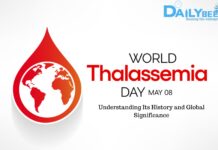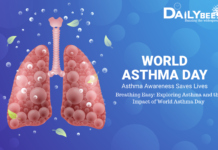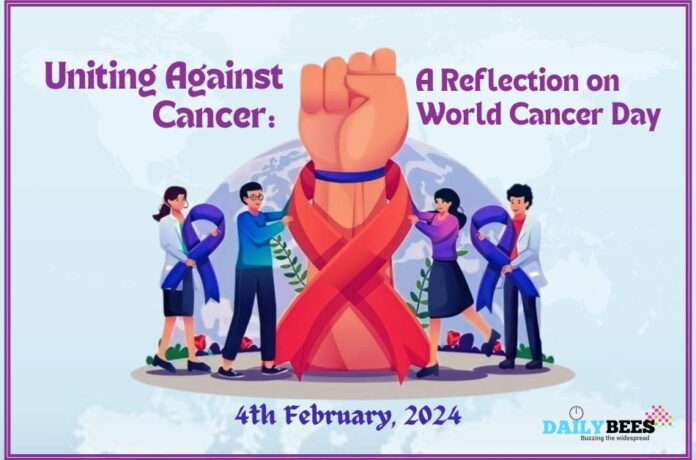World Cancer Day
World Cancer Day is observed on February 4th every year, uniting people around the globe to raise awareness about cancer, its prevention, and treatment. This day serves as a crucial platform to inspire action, celebrate achievements, and encourage everyone to join the fight against this formidable disease. We will explore the significance of World Cancer Day, the impact of cancer on individuals and communities, and the collective efforts needed to create a cancer-free world.
Understanding Cancer:
Cancer comprises a diverse set of illnesses marked by irregular cell growth and division. It can affect any part of the body, leading to the formation of tumors that may be benign or malignant. Malignant tumors, commonly known as cancer, can invade nearby tissues and spread to other parts of the body through the bloodstream or lymphatic system.
Cancer arises from genetic mutations that disrupt the normal regulatory mechanisms controlling cell growth. These mutations can be caused by various factors, including exposure to carcinogens, genetic predisposition, or a combination of both. The complex nature of cancer makes it challenging to pinpoint a single cause, and it often involves a series of genetic changes over time. The disease manifests differently in each individual, leading to a wide range of symptoms and outcomes.
The Impact of Cancer:
Cancer profoundly impacts individuals, families, and communities worldwide. It not only poses a significant threat to life but also brings emotional, financial, and social challenges. The journey of a cancer patient involves medical treatments, emotional resilience, and a constant battle against uncertainties. Families of cancer patients often find themselves navigating a complex web of emotions and responsibilities.
World Cancer Day Objectives:
- Raise Awareness: The primary objective of World Cancer Day is to increase public awareness about cancer, its prevention, early detection, and available treatment options. Knowledge empowers individuals to make informed decisions about their health and encourages proactive measures to reduce cancer risks.
- Reduce Stigma: There is often a stigma associated with a cancer diagnosis, leading to discrimination and isolation. World Cancer Day aims to reduce this stigma, fostering a compassionate and understanding society that supports individuals and families affected by cancer.
- Advocate for Prevention: Many cancers are preventable through lifestyle changes and early detection. World Cancer Day emphasizes the importance of adopting healthy habits, such as regular exercise, a balanced diet, and avoiding tobacco and excessive alcohol consumption.
- Support Patients: Cancer patients need not only medical treatment but also emotional and social support. World Cancer Day promotes a supportive environment that acknowledges the challenges faced by patients and encourages empathy and assistance from the community.
The Role of Early Detection:
Early detection plays a crucial role in improving cancer outcomes. Regular screenings, self-examinations, and awareness of potential warning signs enable healthcare professionals to diagnose cancer at an early stage when treatment is often more effective. World Cancer Day emphasizes the importance of proactive health measures and encourages individuals to prioritize routine check-ups.
Innovations in Cancer Treatment:
Advancements in medical research and technology have led to groundbreaking innovations in cancer treatment. Precision medicine, immunotherapy, and targeted therapies are transforming the landscape of cancer care. These developments offer personalized and more effective treatment options, giving hope to many cancer patients.
The Impact of Lifestyle on Cancer Risk:
Certain lifestyle factors contribute to an increased risk of developing cancer. Tobacco use, poor dietary choices, lack of physical activity, and excessive sun exposure are among the key risk factors. World Cancer Day advocates for lifestyle modifications to reduce these risks, emphasizing the role of individual choices in preventing cancer.
Global Initiatives on World Cancer Day:
World Cancer Day brings together governments, non-governmental organizations, healthcare professionals, and communities worldwide to work towards a common goal. Numerous initiatives are launched to address the diverse challenges posed by cancer, including improving access to healthcare, funding research, and promoting cancer education.
Community Engagement:
Communities play a pivotal role in supporting those affected by cancer. World Cancer Day encourages community engagement through events, support groups, and educational activities. These initiatives help create a sense of solidarity, reduce isolation, and provide a platform for sharing experiences and resources.
Creating a Cancer-Free World:
The vision of a cancer-free world requires a collective effort from individuals, communities, and policymakers. Key components of this vision include:
- Prevention through Education:
- Raising awareness about the causes of cancer and preventive measures.
- Encouraging the adoption of healthy lifestyle choices from a young age.
- Implementing educational programs in schools and communities.
- Early Detection and Screening:
- Promoting routine screenings for common cancers, such as breast, cervical, and colorectal cancer.
- Encouraging self-examinations and awareness of early signs and symptoms.
- Ensuring access to affordable and widespread screening programs.
- Equitable Access to Treatment:
- Addressing disparities in healthcare access to ensure all individuals, regardless of socioeconomic status, can receive quality treatment.
- Supporting initiatives that provide financial assistance to those in need of cancer care.
- Investment in Research:
- Allocating resources for cancer research to explore innovative treatments and potential cures.
- Collaborating on a global scale to share research findings and advancements.
- Psychosocial Support:
- Establishing support networks and counseling services for cancer patients and their families.
- Reducing the stigma associated with cancer through community education and awareness.
World Cancer Day serves as a poignant reminder of the global impact of cancer and the shared responsibility we hold in combating this disease. By fostering awareness, promoting prevention, supporting patients, and advancing research, we contribute to the collective effort to create a world where cancer is no longer a pervasive threat. Together, we can inspire hope, raise awareness, and work towards a future where cancer is preventable, treatable, and ultimately defeated.






























